- Home
- Francine Mathews
Death in a Cold Hard Light Page 4
Death in a Cold Hard Light Read online
Page 4
“Actually—now that you mention it—yeah. I knew him. That’s why the Chief asked me to call his mom.”
Jay Santorski’s death had changed the tenor of Howie’s weekend. He had expected to spend it walking a beat from Main Street to Broad. Instead, Chief Folger had appointed Howie as his personal errand boy, and the patrolman had battled snarled roads, foul weather, and irritable islanders for hours in pursuit of the dead scalloper’s history. In the process, Howie had discovered the true meaning of Christmas Stroll—he was better off walking than trying to navigate the island. Now, fourteen hours after he’d reported for duty, he was finally eating a real meal.
And trying to banish the memory of Jay’s corpse lying ravaged and mute on the Coast Guard boat ramp. Jay was three years younger than Howie. Nobody that age should die.
“I didn’t know you hung with scallopers,” Merry said.
“I don’t, really.”
“How’d you meet him then?”
Howie felt the constriction in his throat ease at the question, and swallowed a mouthful of hamburger. “Jay was Owen Harley’s mate. You know Owen.”
“Never heard of him.”
“I thought you knew everyone, Mere. Harley plays tenor sax in a band I mess around with. I met Jay through him.”
“A band? You, Seitz? Don’t tell me you’re developing character.”
“Well—a personality, at least.” He picked at a forkful of cottage fries. The odors of grease and carbonized protein rose uninvitingly in the air. “We don’t get much time to practice, or anything, and we only play Open Mike nights at the Rose & Crown—”
“What do you play?”
“Swing.” Sudden embarrassment. It was Howie, after all, who had introduced the detective to Seattle grunge.
Merry patted his hand maternally. “I think that’s great, Seitz. By summer, you’ll be headlining, and you’ll leave this sordid island of murder and mayhem far behind. So tell me what you thought of Jay Santorski.”
“I liked him a lot.” Howie set his food to one side and reached for a napkin. “He was smart without being stuck on himself, and he cared about what he did.”
“Scalloping?”
“That, and the harbor in general. What else?” Howie rarely analyzed the people he met; he either liked them or didn’t, and saw or avoided them accordingly. “Jay didn’t brag. He didn’t try to hit on a lot of women. He was a good athlete—I shot hoops with him once or twice. And he never let his partying get out of hand. He was the kind of guy you gave the keys to after a late night.”
“So how’d he end up dead in the harbor?”
Howie shrugged. “Dumb fucking luck.”
She was silent at this—not, he thought, because his profanity had shocked her, but because it echoed the assumptions in her mind. “Did you see the corpse?” she asked.
“Yeah. I had no choice. The Chief called over to the station from Brant Point and wanted Clarence and the Doc.” Clarence was the Nantucket force’s crime scene chief, their resident forensics expert. The Doc was John Fair-born, the medical examiner. “Clarence wasn’t in yet, so I left him a message, took the evidence bag, and met the Doc at the Coast Guard station.”
“Exactly what I would have done.”
Howie took the tacit compliment in stride. “I won’t go into what Jay looked like. It’s not important, except for the needle marks.”
Merry’s green gaze sharpened as she looked at Howie over her hot buttered rum. “Ever notice them before, Seitz?”
“No. And I think I would have noticed.”
“They must have been dramatic enough for the Chief to have called in Clarence.” Merry said it reasonably.
“I don’t think your dad had even seen them. Jay’s clothes weren’t disturbed at all when I got there.” Howie shoved his hand through his ragged curls. “I don’t know what made the Chief think it was anything other than a straightforward drowning. But maybe he would have called Clarence and the Doc anyway. Just to be certain. Your dad always goes by the book.”
“Could be,” the detective conceded.
“When Dr. John and I got there, we helped the Chief look for some identification. I found Jay’s wallet in his back pocket, where it should have been—so he wasn’t held up for his cash…”
“… and then hit over the head with his bicycle and tossed in the water,” Merry finished. “I didn’t think so.”
“Anyway, that’s when we took off his coat, so the Doc could examine him better. Your dad wanted to be sure there were no marks of violence.”
“What else was Santorski wearing?”
“Mayhew House waiter’s uniform—he had a part-time job at Ezra’s. Black dress shoes—laced, they stayed on his feet. Dark blue socks, black pants, black vest, white oxford cloth shirt. The sleeves were rolled up to the elbow.”
“Helpfully revealing the aforementioned needle marks.”
Howie nodded. “On just one arm, the left, so I guess he was right-handed. It would make sense, wouldn’t it?” He pulled up his sleeve and stroked the pale flesh of his inner elbow. One violent green shadow of a vein pulsed and relaxed. “But I gotta say, Detective, there weren’t a whole lot of marks. If Jay had a habit, he didn’t have it very long.”
“You’re not convinced.”
“Neither is his mom.”
“Of course his mom says he never used drugs,” Merry retorted impatiently. “What is she supposed to say?”
“She’s a nurse, Mere. I think she would have noticed.”
Merry registered this without comment. “When did she last see him?”
“Thanksgiving.”
“You mean—last weekend?”
Howie nodded. “He went back to Boston for the holiday. Saw friends from college. Did a little shopping. Had a great time, she said.”
“No sign of addiction? Chills, vomiting, wild mood swings?”
“Not according to Mom.”
“The poor woman.” Merry rested her feet on her coffee table and flipped open Santorski’s file. “Heartbroken?”
Howie shrugged, looked away. “I guess. Yeah. He was her only child. She wanted to know when we’d release the body for burial, and I couldn’t tell her.”
“Father?”
“None that came up.”
Merry settled down to skim Howie’s cursory notes. He could have recited them from memory. Deceased born 10/19/75 and raised in Quincy, Massachusetts, only son of Mary Anne Simpson, a registered nurse. Deceased attended Catholic grade schools, public high. Took leave of absence from Harvard U. in 1996 following junior year.
Merry looked up from the file. “Why would a Harvard boy drop out of college to go scalloping?”
“Guess he liked boats better than homework.”
Deceased moved to Nantucket in July 1996. Past two months worked days as scalloper, nights as waiter at Ezra Mayhew House. Lived in group house at 110 Pilot Whale Drive, Surfside. Roommates: Dave Haddenfield, 25, assistant football coach, Nantucket High; Dr. Barry Cohen, 28, resident, Nantucket Cottage Hospital; Sue Morningstar, 24, editorial staff, the Inquirer & Mirror.
Merry waved the file folder. “Did you know any of these roommates?”
“Just to say hi to. I met ‘em once, when Jay had us over to practice at his house. The doctor came home early and threw us out.”
“Have you talked to any of them yet?”
“All of them. I woke the doctor—Cohen—this morning when I took the bike out to Surfside. He wasn’t happy about it, and he said he hadn’t seen Jay in days. But he identified the bike.”
“I suppose that confirms where Santorski went into the water, at least. Anything obviously wrong with the bike?”
“The brakes are lousy, but it’s a thirty-year-old Raleigh three-speed, Mere, and a little rust shouldn’t be surprising. Clarence called in a technician from Olde’s Bicycles to look the thing over. He said it was basically sound. And I rode it around the block a few times.”
“Did you wear gloves?”
&
nbsp; “Yes. And the bike’s already been dusted for fingerprints. Couple of different sets on them, one of them Jay’s.”
Merry flipped back through the file. “Did the Chief send a dredging team to the Easy Street Basin, Seitz?”
“Not that I heard.”
She muttered something under her breath; it might have been an oath. “Okay. Back to the roommates. How did this Cohen guy take the tragic news?”
Howie shrugged. “Stoically. I guess doctors are used to death.”
“Or think it no longer applies to them. What about the rest of the house?”
“The football coach—Dave—just looked amazed. He kept saying that it wasn’t possible.”
“Where was he around midnight?”
“At his girlfriend’s.” Howie anticipated Merry’s next question and added, “I called. She says he was there.”
“And the reporter?”
“Sue.” Howie’s brow cleared. He liked Sue Mornings tar, and he knew that Jay had liked her, too. “She was pretty devastated, I’m afraid. Almost hysterical. She spent last night at home, watching some Jane Austen movie. Bathrobe and slippers until bedtime.”
“But no witnesses.”
“Not unless you count Emma Thompson.”
“I doubt she pushed Jay and his bike into the harbor just to get a story,” Merry said thoughtfully, “but you never know. If he was pushed. If there is any malice aforethought outside my father’s head.”
“Any what?”
“Never mind. Did Sue know where Jay was last night?”
“She said he was working at Ezra’s, same as always.”
“And what does Ezra’s say?”
Howie wiped his mouth and crumpled the napkin. “Actually, this is where it gets a little interesting. Jay was sent home early because it was a slow night. He was out the door by ten.”
“Time enough to have a few drinks—or shoot up—somewhere in town,” the detective mused. “Did anyone from the restaurant notice anything odd about Jay’s behavior?”
“The dining-room manager wasn’t entirely surprised he’d gotten into trouble.”
Merry’s eyebrows lifted. “Did he know the guy was using needles?”
“She. A Miss Laurie Hopfnagel. She never said anything about drug use—but to be honest, Mere, the Chief asked me to keep that part of the business quiet until we have the autopsy results.”
“Cautious of him,” Merry commented. “I guess Dad’s learning discretion in his old age. Why did Hopfnagel dislike Santorski?”
Howie took a sip of his iced tea before answering. “She thinks he was stealing from his coworkers.”
“Stealing what, exactly?”
“Tips. From their tables. Hopfnagel says she was planning to give Jay the boot once Christmas Stroll was over.”
Merry laughed abruptly. “Well, he denied her the pleasure. What do you think, Seitz? Was Santorski the type to steal from his friends?”
“No. Why would he? He worked two jobs. And he never seemed hard up.” With a ready source of cash at the Ezra Mayhew House, Howie thought belatedly, why should he? It was a point Merry Folger was not likely to miss. But her expression never changed as she considered his words.
“Was Hopfnagel plausible?”
“Plausible enough. But I didn’t like her.”
“Sorry, Seitz. Personal attraction means nothing in a court of law. Maybe Jay needed some extra cash to pay for his habit. A small bag of heroin sells for about twenty dollars. A night’s tips would more than cover it.”
“If he had a habit.”
She looked at Howie searchingly. “You’re really not convinced?”
“It’ll take an autopsy report to change my mind.”
Merry set his report carefully on the coffee table, as though it had nothing more to reveal. “If Dad swore you to silence on the subject of drugs, I suppose you didn’t query Jay’s roommates about them either.”
“The only person I asked about illegal drug use was Jay’s mom.”
“With the Chief’s blessing?”
Howie reddened. “Without it, actually. I had to ask, Mere. I figured she’d know.”
“Most parents never do.”
“Jay loved his mom. He kept her picture in his room.”
“Seitz—” Merry began, but the patrolman hurried past her words.
“Not all drug injections are illegal, Mere. Maybe Jay had a legitimate health problem.”
“Did you ask his doctor-roommate?”
“Cohen said he thought Jay was as healthy as a horse. But he really didn’t know much about him, if you ask me. Guy lives at Cottage Hospital most of the time.”
“I suppose Santorski could have had a different doctor on-island.”
“Or maybe he saw one while he was home last weekend.”
“Did his mother say so?”
“No.”
“Although he told her everything immediately, as evidenced by the picture he kept in his room,” Merry shot back sharply. “Look, Seitz—it’s always hard to think the worst of a friend. But maybe Jay was experimenting with something he’d never done before. Maybe his luck ran out, and he used too much, and died before he could get help. Overdoses are commonplace. There’s so much heroin coming out of Turkey these days, the dealers don’t even bother to cut it very much. The street dose is far too pure.”
Howie was from a generation that had put heroin back on the map. He’d seen the fashion magazines glorifying emaciated girls, their eyes ringed in black; he’d gone to school in the city that dealt in drugs daily; and he was trained as a cop. But he would never feel as conversant with drug culture as Merry sounded now. “Where’d you learn about all this?” he asked her curiously.
“Heroin was the drug of choice in New Bedford, where I did my rookie tour. I logged a lot of hours busting dealers and the kids they employed to push the stuff, It’s only gotten worse since I left.” Her clipped words didn’t invite much comment; and Howie felt suddenly awkward. Too aware of his relative youth.
“I guess that’s why your dad wanted you home today,” he attempted.
Merry’s eyes came up to his. She smiled faintly. “God knows why the Chief bothers with any of us, Seitz. But Jay Santorski wasn’t from New Bed. He was a Harvard boy dabbling in risk—if he had heroin in his veins when he went into the Easy Street Basin. What was he doing here, anyway? And why did this Owen Harley hire him? I’d have thought an established scalloper would prefer a seasoned mate.”
“I never thought to ask. I know that sounds stupid—”
“Then I will. Are you on duty tomorrow, Seitz?”
“I am now.”
“Good. Let’s make a list.”
Howie reached for his notebook obediently.
“I want to see the body, first thing. It hasn’t been sent off-island yet?”
“In this weather?” Howie grinned, remembering the color of Merry’s face as she extricated herself from the Island Air plane. She had already forgotten it.
“While I’m out at the hospital, I want the Pottses diving in the basin. Or at the very least, a couple of scallopers dredging the bottom. Dad should have arranged for that this morning.”
“Weather,” Howie whistled under his breath.
“Did you search Santorski’s room?”
He looked at her over the edge of his notebook. “I sealed it. Thought you’d want to search it yourself.”
“We’ll have to hope the housemates respect police barriers. I might as well interrogate them while I’m out in Surfside. And Owen Harley, of course.”
“Want me to come?”
“I’d rather you supervised the dredging. And asked the residents of Old North whether they heard or saw anything unusual last night.”
Howie wrote these instructions down, although that hardly seemed necessary, and closed his notebook with care. “One more thing about Owen Harley, Mere. It’s in the report, but I don’t think you got to it.”
“Shoot.”
“Harley feel
s—responsible, I guess.”
“For Jay?”
“For his death. Harley lives on Old North Wharf. Jay was probably going to see him when he fell into the water.”
Chapter Five
Merry sat quietly for perhaps a quarter hour after Howie Seitz had left, nursing the last of the buttered rum. Her relief at being once more in the comfortable arms of her own living room was exquisite; she wanted nothing so much as to slip into a viciously hot bath and then into bed. The ease of the moment was transitory, however; she could feel the sharp edge of unrest slicing just beyond conscious thought. What lurked there, exactly? Awareness of Peter’s absence? The shadow of the morning’s ugliness, and a fear of all it presaged? Or the death of the young scalloper, whom she had dismissed out of hand as a drug user like so many others—lost, foolish, hell-bent on self-destruction. But nothing Seitz had said tonight could really confirm those assumptions. Jay Santorski refused to lie down and play a statistic. Perhaps this was the cause of her father’s palpable discomfort over the phone; he could not pigeonhole the death.
Then why hadn’t the Chief ordered the basin dredged? And why the embargo on intravenous drugs—a desire to speak well of the dead until forced to do otherwise?
Why exactly had John Folger called her home?
At that thought, the last shred of transitory comfort dissipated and was gone.
Merry pulled on a sweater and a rain slicker and forced herself out into the gale that was Fair Street. Her garage apartment was just a few blocks from the old Folger house on Tattle Court, but tonight the narrow stretch of macadam, with its sodden piles of leaves and streaming gutters, was endless and lonely. Majestic old Federal houses lined both sides of the street, exquisite in white-painted clapboard and moss-rimmed shingles; most of them looked blankly into the middle distance as she passed, their windows dark. Owned by summer people who had failed to make it back for Christmas Stroll, Merry thought; and missed Peter with every atom of her being.
Tattle Court, at least, was ablaze with light. Someone—Ralph Waldo, probably—had hung a fir wreath on the door. The raw cold turned the acidic smell of evergreen more piercing. Merry pressed the bell and waited.
“Meredith Abiah!” Ralph Waldo cried as he flung open the door. “You’re just in time for dessert.” He peered over her head into the rain-lashed darkness, hoping for a glimpse of Peter, then ushered her inside.

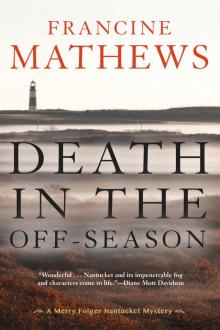 Death in the Off-Season
Death in the Off-Season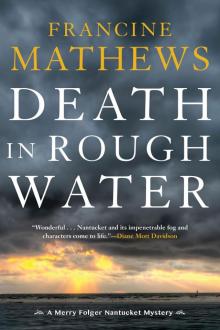 Death in Rough Water
Death in Rough Water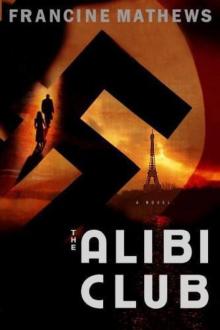 The Alibi Club
The Alibi Club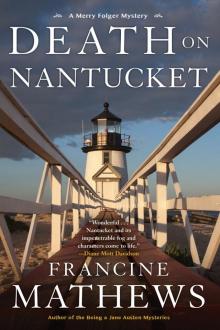 Death of a Wharf Rat
Death of a Wharf Rat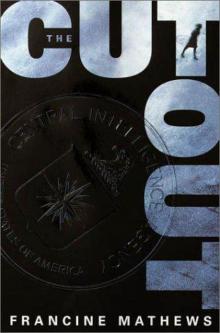 The Cutout
The Cutout The Secret Agent
The Secret Agent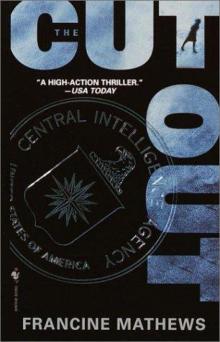 The Cutout cc-1
The Cutout cc-1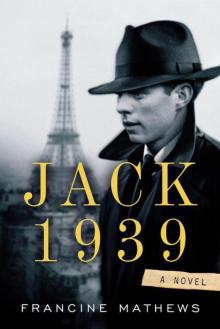 Jack 1939
Jack 1939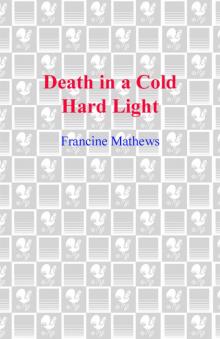 Death in a Cold Hard Light
Death in a Cold Hard Light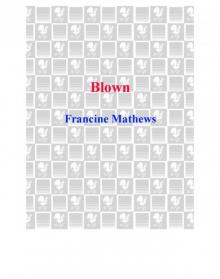 Blown
Blown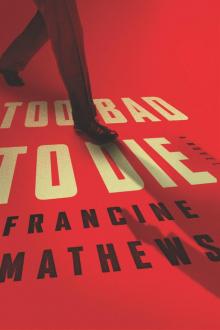 Too Bad to Die
Too Bad to Die